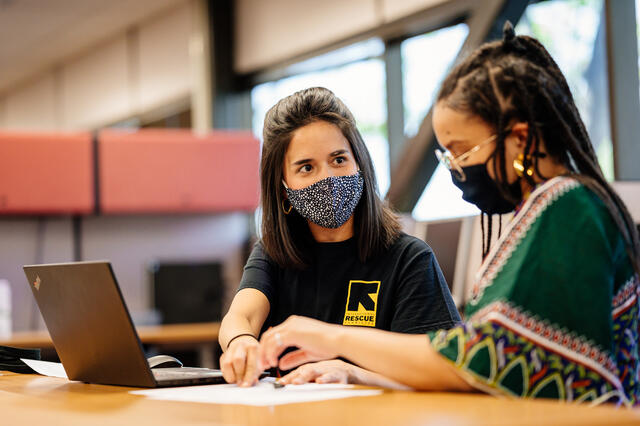
In July 2021, the International Rescue Committee (IRC) in Salt Lake City launched the Hospitality Link program with generous support from Marriott International. The Hospitality Link—a multi-faceted program of the IRC originally launched in New York City and Northern California—seeks to provide training for newly arrived refugees on various skills required for work in the hospitality sector, as well as additional financial and digital literacy education. The program is built in partnership with Salt Lake Community College (SLCC), where professionals in the sector provide specific training on technical and managerial skills in the industry. After completing the training, participants receive a certification from SLCC.
The training with SLCC takes a total of six weeks, during which the professors provide classes on a number of subjects, including understanding body language and non-verbal cues, and other cultural practices that Americans may not think twice about but someone new to the U.S. might not know. “They’ve spoken about cultural differences between what Americans would tend to expect from service in the hospitality sector, and how to present yourself,” Carolina Terrazas, financial capability assistant, explains. She and Brenda Montecinos Villa, financial capability coordinator, agree that many of the trainings focus on transferable skills that can be useful in fields outside of the hospitality sector, too.
After the six-week training with SLCC, Brenda and Carolina provide additional training on financial literacy and work with the IRC’s Education Program to provide digital literacy training for the participants.
Brenda says, for her, the program has provided good insight into the interests and desired areas of learning of participants. Carolina sees the Hospitality Link as a valuable first step to gain transferable skills and cultural understanding for employment in the U.S. Carolina and Brenda have seen incredible efforts and dedication from the participants in the cohorts. “They know there has to be a way to get a job to be able to build wealth, that’s the American Dream. I think the Hospitality Link has provided those skills [to get a job] – whether for staying in hospitality or for something else,” Carolina says.
The effort put forth by the participants in the cohorts has not gone unnoticed by Brenda and Carolina. Something that stood out to Carolina in the first cohort was a participant who would recap the material covered during the training and help his fellow participants gain a better understanding. “The other participants were so captivated and one of them taking notes,” Carolina smiles, “there’s such a sense of community.”
The second cohort of the Hospitality Link is set to receive certification in the coming weeks, ready to be employed in the hospitality sector. If you have an employment opportunity or want to learn more about how to employ refugees, email us at SaltLakeCity@Rescue.org.